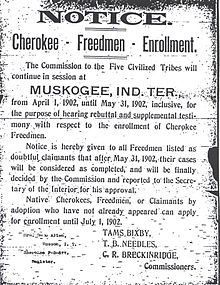- Dawes Commission
-
The American Dawes Commission, named for its first chairman Henry L. Dawes, was authorized under a rider to an Indian Office appropriation bill, March 3, 1893.[1] Its purpose was to convince the Five Civilized Tribes to agree to cede tribal title of Indian lands, and adopt the policy of dividing tribal lands into individual allotments that was enacted for other tribes as the Dawes Act of 1887. In November 1893, President Grover Cleveland appointed Dawes as chairman, and Meridith H. Kidd and Archibald S. McKennon as members.
During this process, the Indian nations were stripped of their communally held national lands, which was divided into single lots and allotted to individual members of the nation. The Dawes Commission required that individuals claim membership in only one tribe, although many people had more than one line of ancestry. Registration in the national registry known as the Dawes Rolls has come to be critical in issues of Indian citizenship and land claims. Many people did not sign up on these rolls because they feared government persecution if their ethnicity was formally entered into the system. People often had mixed ancestry from several tribes. According to the Dawes Commission rules, a person who was 1/4 Cherokee and 1/4 Creek had to choose one nation and register simply as '1/4 Cherokee', for instance. That forced individuals to lose part of his or her inheritance and heritage.[citation needed]
Although many Indian tribes did not consider strict 'blood' descent the only way to determine if a person was a member of a tribe, the Dawes Commission did. Many Freedmen (slaves of Indians who were freed after the Civil War), were kept off the rolls as members of tribes, although they were emancipated after the war and, according to peace treaties with the United States, to be given full membership in the appropriate tribes in which they were held. Even if freedmen were of mixed-race ancestry, as many were, the Dawes Commission enrolled them in separate Freedmen Rolls, rather than letting them self-identify as to membership.
Many Creek Freedmen are still fighting the membership battle today against the Creek Nation, as they attempt to share in contemporary benefits of citizenship. The tribe has defined as members only those who are descended from a Creek Indian listed on the Dawes Rolls.[citation needed] A similar controversy has embroiled Cherokee Freedmen and the Cherokee Nation. The Cherokee Nation voted in a referendum (from which the Freedmen were excluded) to exclude all Freedmen except those who could prove descent from a Cherokee on the Dawes Roll.
The result of the Dawes Commission was that the five Indian nations lost most of their national land bases, as the government declared as "surplus" any remaining after the allotment to individual households. The US sold the surplus land, formerly Indian territory, to European-American settlers. In addition, over the next decades, settlers bought land from individual Indian households, thus reducing overall land held by tribal members. The Indians received money from the overall sale of lands, but lost most of their former territory. As tribes began to re-establish self-government after 1934, and especially since the 1970s, they have tried to end the sales of tribal lands.
Angie Debo's landmark work, And Still the Waters Run: The Betrayal of the Five Civilized Tribes (1940), detailed how the allotment policy of the Dawes Commission and the Curtis Act of 1898 was systematically manipulated to deprive the Native Americans of their lands and resources.[2] In the words of historian Ellen Fitzpatrick, Debo's book "advanced a crushing analysis of the corruption, moral depravity, and criminal activity that underlay white administration and execution of the allotment policy."[3]
References
- ^ Encyclopedia of Oklahoma History and Culture: In 1893 Checotah was chartered by the Creek Nation and the Dawes Commission held its first meeting here in Lerblance Hall.
- ^ Angie Debo, And Still the Waters Run: The Betrayal of the Five Civilized Tribes (Princeton: Princeton University Press, 1940; new edition, Norman: University of Oklahoma Press, 1984), ISBN 0691046158.
- ^ Ellen Fitzpatrick, History's Memory: Writing America's Past, 1880-1980 (Cambridge: Harvard University Press, 2004), ISBN 067401605X, p. 133, excerpt available online at Google Books.
External links
- Dawes Packets, the original applications for tribal enrollments
- Kent Carter, The Dawes Commission and the Allotment of the Five Civilized Tribes, 1893-1914 (Ancestry Publishing, 1999) (excerpt available here)
- Encyclopedia of Oklahoma History and Culture - Dawes Commission
Categories:- Native American law
- American Old West
- Native American history of Oklahoma
- Cherokee Nation (19th century)
Wikimedia Foundation. 2010.

